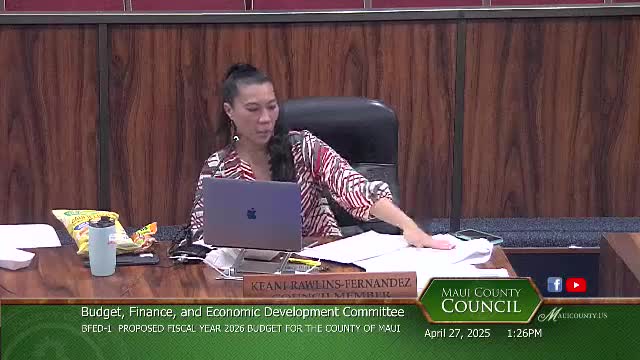Maui committee raises top tiers on property classes, approves FY26 real‑property tax schedule
Get AI-powered insights, summaries, and transcripts
Subscribe
Summary
The committee set new FY26 real property tax rates including a higher top tier for non‑owner‑occupied properties and increases to timeshare and short‑term rental top tiers; members adopted the amended rate schedule after debating tier structure and the county—s revenue target.
The Budget, Finance & Economic Development Committee of the Maui County Council on Sunday adopted an amended FY26 real‑property tax (RPT) rate schedule that raises top tiers for several property classes in order to help close the committee—s remaining general‑fund imbalance.
The committee approved changes that include a higher third tier for non‑owner‑occupied (investment) properties, an increase to the timeshare class rate, and an increase to the highest tier of short‑term/vacation rental (TBR) rates. After members— amendments and votes, staff reported the adopted rate package would generate roughly $26.07 million above the mayor—s certified revenue baseline, which the committee used to cover outstanding general‑fund needs and the charter-required 1% open‑space transfer.
Why it matters: The adopted rates affect commercial owners, investors and short‑term rental operators across Maui County and supply most of the near‑term revenue the committee needs to balance its FY26 package without restoring all the cuts members made to operating and capital accounts.
Major rate changes adopted - Non‑owner‑occupied (investment) properties: committee increased the top tier (properties above the high threshold) to $17 per $1,000 of assessed value (third tier) to target higher‑value investment parcels.
- Timeshare classification: the committee approved raising the timeshare class rate to $16.60 per $1,000.
- Short‑term rentals / TBR (mayor—s tier thresholds): committee raised the top tier to $16.50 per $1,000.
- Long‑term rental (owner occupied vs. investor split): the committee also adopted a distinct long‑term rental schedule using the mayor—s tier thresholds (roughly $2.95, $5 and $12 for the three tiers as discussed) and accepted an amended owner‑occupied tier schedule for primary residences (first tier eased modestly; second tier adjusted to provide targeted relief; highest tier raised modestly for high‑value homes).
Committee discussion and votes Councilmembers discussed equity and appeal risk: several members said they favored increasing top tiers on investment and short‑term classes to get revenue from higher‑value properties rather than increasing rates on owner‑occupied (primary residence) taxpayers. Others warned that heavy increases could trigger assessment appeals, which could reduce realized revenue in future years.
After a motion by Councilmember Tamara Paulton to set a comprehensive package of rate changes and a later amendment from Councilmember Tom Cook that adjusted commercial/residential and non‑owner‑occupied tiers, the committee adopted the final package on a roll call. Staff calculated the package would generate $26,069,144 over the certified baseline; staff and counsel noted the committee also must include the charter 1% open space transfer in final posting. The motion as amended passed by voice/roll call vote with nine ayes recorded for the final RPT package.
Attribution: Direct attributions in this article come from multiple councilmembers and staff statements recorded in the meeting transcript; when quoted the speaker is identified using the meeting speaker list.
Ending: Committee staff will post the rate schedule for the required public notice and the committee reconvened the next day to finalize the committee report and correct any posting calculations as needed.
